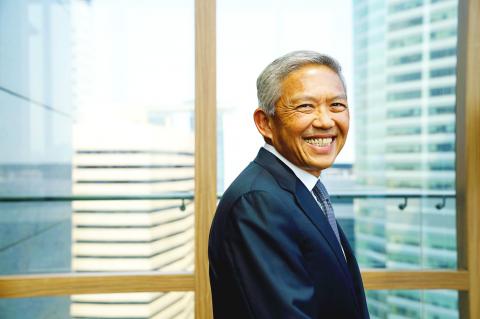Bank of Singapore Ltd (新加坡銀行), the private banking arm of Oversea-Chinese Banking Corp (OCBC, 華僑銀行), is looking to expand its family office business as the city-state rolls out the red carpet for wealthy investors.
“We are seeing increasing demand for families moving into the next generation to set a proper structure in place to manage family wealth,” chief executive officer Bahren Shaari said in an interview on Thursday. “Singapore is promoting that, to let families use it as a base to manage their investment activities globally.”
Bank of Singapore’s expansion would heighten competition with European firms such as UBS Group AG and Credit Suisse Group AG, who have long dominated this space.

Photo: Bloomberg
Singapore family offices had average assets under management of US$857 million last year, nearly double the Asia-Pacific average of US$445 million, according to a survey of 262 such offices in a UBS/Campden report.
The expansion is to be spearheaded by Lee Woon Shiu (李文修), a managing director who currently looks after Bank of Singapore’s wealth planning and trust solutions, Shaari said.
While the bank does not plan to substantially increase the number of relationship managers it employs from about 400 now, it aims to double assets under management to US$500 million per banker over the next three to four years, he told Bloomberg TV on Friday.
Bank of Singapore also plans to open a new Taiwan unit to tap OCBC’s onshore presence.
The expanded family office business in Singapore would especially focus on rich families from China, Europe, and the Middle East, who are looking to invest in the Southeast Asian nation.
The Singapore government provides incentives including tax exemptions for funds managed by family offices for both offshore and onshore vehicles.
That offers the advantage that the offices would not pay Singapore tax on most of its investment gains, Shaari said.
Bank of Singapore’s assets under management rose to US$100 billion last month, after increasing an average 21 percent each year over the past five years.
The bank ranked No. 7 among Asia’s largest private banks in 2016, data compiled by Asian Private Banker showed.
To help expand its wealth and family office business in Europe, Bank of Singapore hired Anthony Adriano Simcic this month from HSBC Private Bank in Luxembourg. Simcic is to remain in the European city, which would be used as a base in addition to London.

With this year’s Semicon Taiwan trade show set to kick off on Wednesday, market attention has turned to the mass production of advanced packaging technologies and capacity expansion in Taiwan and the US. With traditional scaling reaching physical limits, heterogeneous integration and packaging technologies have emerged as key solutions. Surging demand for artificial intelligence (AI), high-performance computing (HPC) and high-bandwidth memory (HBM) chips has put technologies such as chip-on-wafer-on-substrate (CoWoS), integrated fan-out (InFO), system on integrated chips (SoIC), 3D IC and fan-out panel-level packaging (FOPLP) at the center of semiconductor innovation, making them a major focus at this year’s trade show, according

DEBUT: The trade show is to feature 17 national pavilions, a new high for the event, including from Canada, Costa Rica, Lithuania, Sweden and Vietnam for the first time The Semicon Taiwan trade show, which opens on Wednesday, is expected to see a new high in the number of exhibitors and visitors from around the world, said its organizer, SEMI, which has described the annual event as the “Olympics of the semiconductor industry.” SEMI, which represents companies in the electronics manufacturing and design supply chain, and touts the annual exhibition as the most influential semiconductor trade show in the world, said more than 1,200 enterprises from 56 countries are to showcase their innovations across more than 4,100 booths, and that the event could attract 100,000 visitors. This year’s event features 17

EXPORT GROWTH: The AI boom has shortened chip cycles to just one year, putting pressure on chipmakers to accelerate development and expand packaging capacity Developing a localized supply chain for advanced packaging equipment is critical for keeping pace with customers’ increasingly shrinking time-to-market cycles for new artificial intelligence (AI) chips, Taiwan Semiconductor Manufacturing Co (TSMC, 台積電) said yesterday. Spurred on by the AI revolution, customers are accelerating product upgrades to nearly every year, compared with the two to three-year development cadence in the past, TSMC vice president of advanced packaging technology and service Jun He (何軍) said at a 3D IC Global Summit organized by SEMI in Taipei. These shortened cycles put heavy pressure on chipmakers, as the entire process — from chip design to mass

SEMICONDUCTOR SERVICES: A company executive said that Taiwanese firms must think about how to participate in global supply chains and lift their competitiveness Taiwan Semiconductor Manufacturing Co (TSMC, 台積電) yesterday said it expects to launch its first multifunctional service center in Pingtung County in the middle of 2027, in a bid to foster a resilient high-tech facility construction ecosystem. TSMC broached the idea of creating a center two or three years ago when it started building new manufacturing capacity in the US and Japan, the company said. The center, dubbed an “ecosystem park,” would assist local manufacturing facility construction partners to upgrade their capabilities and secure more deals from other global chipmakers such as Intel Corp, Micron Technology Inc and Infineon Technologies AG, TSMC said. It